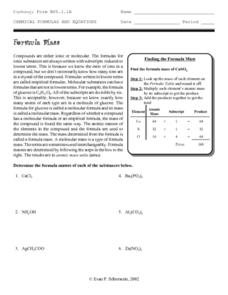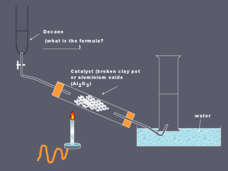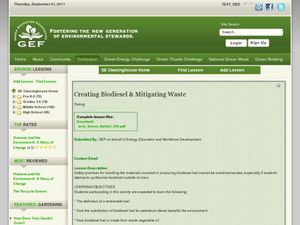Curated OER
The Ties that Bind
In this bonding worksheet, students read about the types of bonds that hold compounds together. They are given fifteen common materials and they identify the types of bonds that hold each together.
Curated OER
States of Matter
In this states of matter worksheet, students are given 15 statements and they fill in the blank with terms related to solids, liquids and gases and the transition from one state to another. Students use the clues to complete a crossword...
Curated OER
Chemical Elements and Compounds Crossword
In this elements instructional activity, students complete a crossword puzzle by figuring out the vocabulary words associated with the 25 clues given.
Curated OER
Main Group: Properties and Reactivity
In this main group worksheet, students apply their knowledge of the organization of the periodic table to correctly answer 30 multiple choice questions. Students relate information about the properties of the different groups and their...
Curated OER
Worksheet 2-2 Stoichiometric Tools
In this stoichiometry worksheet, students solve a variety of problems including finding empirical and molecular formulas, determining molarities of solutions, determining molecular weights of compounds and calculating the percent mass of...
Curated OER
Formula Mass
In this formula mass worksheet, students read about molecular substances and their formula masses. They find the formula masses for six compounds using the atomic masses of its elements.
Curated OER
Exam Review: Chemistry Calculations
In this chemistry calculations review worksheet, students solve 33 review problems about titrations, precipitates, pressure and volume of gases, combustion reactions, heat of combustion, molar concentrations and molecular formulas.
Curated OER
Comparing Light Bulbs
Fifth graders compare filaments in different light bulbs. In this science lesson, 5th graders view the filaments of light bulbs under a microscope.
Curated OER
Ionic Compounds
For this compounds worksheet, students review the structure and properties of ionic compounds, their formulas and nomenclature, and molecular mass and percentage composition. This worksheet has 4 short answer questions and 7 problems to...
Curated OER
Addition Reactions
Here is a PowerPoint that displays multiple organic compound structures and asks viewers to identify the formulas, isomers, or potential products after a given addition reaction. This is a comprehensive set of slides that reviews...
Curated OER
Science: What Happens to Create the Lode?
Learners understand how mineral deposits are formed and why they are not evenly dispersed. They create and describe three different precipitates from four solutions simulating mineral ore deposit formation in sedimentary rock.
Curated OER
Diffusion across a Selectively Permeable Membrane
Lab groups fill a section of dialysis tubing with glucose and starch solutions and suspend it in a water bath. They use iodine as a starch indicator and a glucose test strip to find out if either of the materials crossed the selectively...
Curated OER
Chemical Equations and Reactions
Graphic organizers, photos, diagrams, and text bring the world of chemical reactions to life. By viewing this presentation, young chemists learn how to recognize when a chemical reaction has occurred, and how to balance chemical...
Curated OER
Creating Biodiesel and Mitigating Waste
Biotechnology pros produce their own biofuel using waste oil and fresh vegetable oil. They test the quality of their product using titration techniques and pH analysis. They write their observations and report their findings. Be aware...
Curated OER
The Mathematics of Chemical Formulas
Wow! This is one of the most exhaustive presentations on finding chemical formulas that you will come across! Beginning with the basics, and leaving junior chemists with procedures and concrete examples, this PowerPoint certainly...
National Institute of Open Schooling
Mole Concept
Learners explore atomic measurement in the first activity in a series of 36. Through readings, activities, and questions, classes review standard SI units, learn about Avogadro's constant, and use it to help them calculate moles. They...
Curated OER
Gases and Plasmas
Students determine what plasma is and why the sun is made up of plasma. They recognize situations where plasmas are found in nature and made by man. They discuss why the sun is a huge ball of plasma and if there are different levels of...
American Chemical Society
Air, It's Really There
Love is in the air? Wrong — nitrogen, oxygen, and carbon dioxide are in the air. The final lesson in the series of five covers the impact of temperature on gases. Scholars view a demonstration of gas as a type of matter before performing...
Colorado State University
Why Can Warm Air "Hold" More Moisture than Cold Air?—Vapor Pressure Exercise
Does it feel a little humid in here? Learners assume the role of water vapor in the atmosphere as they explore the differences between warm and cold air. They roll dice to determine their level of energy, which determines if they...
Creative Chemistry
Maths for AS Chemistry
No practice problems are given on this handout; it is a detailed list of concepts to know and tips for working related problems in chemistry. Give this to learners as a study guide, or use it early in your career as a chemistry...
Urbana School District
Thermodynamics
Entropy, it isn't what it used to be. Presentation includes kinetic-molecular theory, heat and internal energy, thermal equilibrium, temperature scales, laws of thermodynamics, entropy, latent heat of fusion, specific heat, calorimetry,...
Curated OER
The Mole Concept
The need for a counting unit is mentioned as you introduce the mole to your young chemists. Use this presentation to explain Avogadro's number and describe the incredible quantity it represents. Lecture notes are included for most of the...
Curated OER
Temperature and Thermal Energy
Examine how heat can be transferred between systems by reconstructing a diagram on energy flow and solving problems on heat flow and work done.
Chicago Botanic Garden
Carbon, Greenhouse Gases, and Climate
Climate models mathematically represent the interactions of the atmosphere, oceans, land, sun, surface, and ice. Part two in the series of four lessons looks at the role greenhouse gases play in keeping Earth warm and has participants...

























